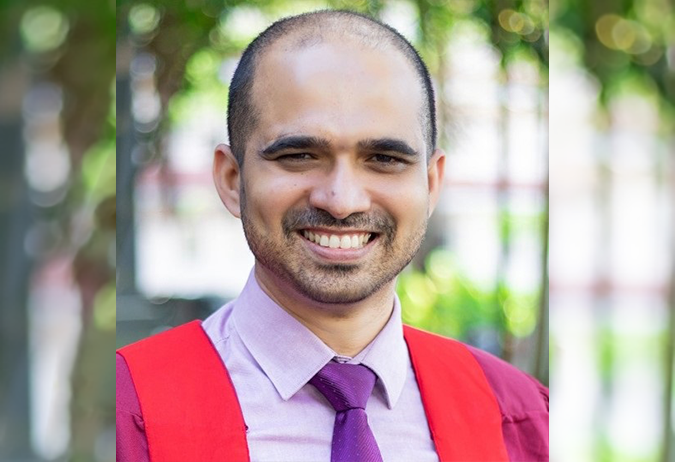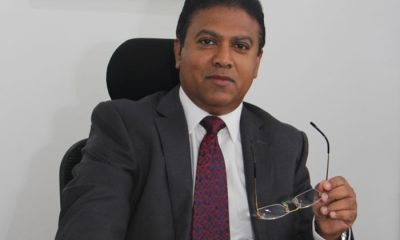Business
Academic says there’s a ‘silver lining’ in brain drain

-
SL diaspora is privy to most updated technologies in advanced economies
-
Govt can take a cue from India and introduce a special visa category for them
-
Diaspora entrepreneurs’ linkage with global networks should be harnessed
by Sanath Nanayakkare
Policymakers can encourage the Sri Lankan talent pool which is spread across the developed countries to shift their base back home if they pull the right policy levers, said the head of department of a leading university in Sri Lanka.
Dr. Janaka Fernando, Head of Department of Business Economics, Faculty of Management Studies and Commerce at the University of Sri Jayewardenepura said so in the backdrop of widely spreading fear that skilled migration will have overwhelmingly negative effects on Sri Lanka.
Exclusively speaking to The Island, he said,” The Sri Lankan talent pool which has found stable doing business and improved living conditions in developed countries can be lured to shift or relocate their operations in Sri Lanka if the policymakers correctly identify their capacities, interests and their patriotism.”
“A fair share of this Sri Lankan talent pool in those countries would come back home to start new businesses in their motherland if the authorities make the domestic environment conducive to professionalism, startups, incubator nest hubs, industrial parks etc.,” he said.
The following are some excerpts from the interview with Dr. Fernando.
“Brain drain isn’t a new phenomenon in Sri Lanka. It has been in existence for more than six decades and it occurred in different ways at different stages of our history. The diaspora includes all communities of the country, not only Tamils as erroneously interpreted very often. With the gaining of Independence from the colonial masters in 1948 and with the advent of the Sinhala Only Act in 1956, economically and administratively active European descendants who had made Sri Lanka their second home left the country for good.
Subsequently, in the first few years of 1970s when the features of a closed-economy were dominant in the country, many professionals including doctors, engineers and lawyers left Sri Lanka to live and work the in the West. I would be remiss if I didn’t mention the legacy of what came to be known as Black July in 1983 where Tamil separatists had stepped up militant attacks in the North killing 13 soldiers, and over the next few days, some members of the Sinhalese majority took revenge causing havoc around the country. This unfortunate turn of events led to a mass exodus of educated members of the Tamil community to other countries.
And in the 1990s-2000s when bomb blasts were taking place and the country engaged in a war to crush terrorism, another wave of Tamil professionals departed from Sri Lanka. Around this time, universities had been closed for three consecutive years from 1986 to 1989 due to political unrest and many students from affluent families left the country to pursue their higher education in foreign countries. So, this is a brief overview of how migration happened in the past. And today, we are witnessing the largest-ever exodus of qualified professionals as a result of the deeper implications and consequences of the current economic crisis.”
“You see, this time the brain drain is starkly different from the past scenarios and you cannot really blame the people going out because who does not want to improve standard of life? However, I think this situation has a silver lining too. If the policymakers take advantage of the often-overlooked aspects, the brain drain could be turned into a win-win situation for the country as well as the skilled migrants in the medium to long term.”
“Not only in Sri Lanka, the migration of skilled workers is a persistent trend in many developing countries, and therefore, as a country we need to look at how we can strategically attract skilled migrants to come back after some time and make Sri Lanka more attractive to international capital investment as well as an oasis for knowledge industries which are based on intensive use of technology and human capital.”
“We need to understand that migration takes place because of push factors in Sri Lanka and pull factors in the receiving countries. So, the authorities must avoid measures to limit or tax skilled migrants’ decisions to leave the country because it goes against the democratic norms of the country and the fundamental freedom of choice. Instead, the authorities should facilitate them to migrate because these skilled professionals are privy to most updated technologies and best work practices in those countries.”
“Let’s not forget that many of our professionals abroad have built purposeful connections and networks in these advanced economies, therefore, Sri Lanka can leverage this ‘brain circulation’ for its rapid development and economic growth. If we harness it properly, it can trigger a flow back of knowledge, new technologies and foreign direct investments (FDI) to the country.
If we can entice at least a small percentage of the Sri Lankan diaspora to come back and operate from Sri Lanka, they will have the capacity to form the back bone of a new economic order especially by innovating lucrative products for the global ICT marketplace. So the government must work towards the goal of providing them with amenities similar to what they would get in the foreign lands they go to. If we can do this, we will be able to attract back at least a few of them who have the true transformative capacity to help Sri Lanka in its growth journey.”
“Already without any government intervention, a few individuals of Sri Lanka’s patriotic diaspora have shifted their base back home because they identified the favourable opportunities in Sri Lanka. Virtusa Corporation founded by Kris Canekeratne, WSO2 founded by Dr.Sanjiva Weerawarana, CodeGen founded by Dr. Harsha Subasinghe, Orion City founded by Jeevan Gnanam, for example, have earned a lot of name and fame for what they are specialized in and have become foreign currency revenue earners to reckon with, in their respective fields.
They interconnected their operations to Sri Lanka driven by their own passion and passed the benefit to the county regardless of little support from the policymaking side. But such passionate volunteering by the Sri Lankan diaspora needs to be spurred by the government without much delay. The government can take a cue from India in this regard and introduce a special visa category for the diaspora members, and create tech hubs and science parks to facilitate them to bring their operations to Sri Lanka. When such visionary entrepreneurs come, other professionals also will see that the country is doing all the right things to achieve its full growth potential, and they will also jump on the growth bandwagon,” Dr. Janaka Fernando said.
Business
AHK Sri Lanka champions first-ever Sri Lankan delegation at Drupa 2024

The Delegation of German Industry and Commerce in Sri Lanka (AHK Sri Lanka) proudly facilitated the first-ever Sri Lankan delegation’s participation at Drupa 2024, the world’s largest trade fair for the printing industry and technology. Held after an eight-year hiatus, Drupa 2024 was a landmark event, marking significant advancements and opportunities in the global printing industry.
AHK Sri Lanka played a pivotal role in organising and supporting the delegation, which comprised 17 members from the Sri Lanka Association for Printers (SLAP), representing eight companies from the commercial, newspaper, stationery printing, and packaging industries. This pioneering effort by AHK Sri Lanka not only showcased the diverse capabilities of Sri Lanka’s printing sector but also facilitated vital bilateral discussions with key stakeholders from the German printing industry.
Business
Unveiling Ayugiri: Browns Hotels & Resorts sets the stage for a new era in luxury Ayurveda Wellness

In a captivating reimagining of luxury wellness tourism, Browns Hotels & Resorts proudly unveiled the exquisite Ayugiri Ayurveda Wellness Resort Sigiriya. This momentous occasion, celebrated amidst a vibrant and serene grand opening on the 6th of June, heralds a new chapter in the Ayurveda wellness tourism landscape in Sri Lanka. Nestled amidst 54 acres of unspoiled natural splendour, Ayugiri features 22 exclusive suites and stands out as the only luxury Ayurveda wellness resort in the country offering plunge pools in every room, rendering it truly one-of-a-kind.
The grand opening of Ayugiri Ayurveda Wellness Resort was an enchanting event, where guests were captivated by the melodies of flutists and violinists resonating through Sigiriya’s lush landscapes. As traditional drummers and dancers infused the air with vibrant energy, Browns Hotels & Resorts’ CEO, Eksath Wijeratne, Kotaro Katsuki, Acting Ambassador for the Embassy of Japan and General Manager, Buwaneka Bandara, unveiled the resort’s new logo, marking a significant moment witnessed by distinguished guests from the French Embassy, Ayurveda and wellness enthusiasts along with officials from the Sigiriya area, LOLC Holdings and Browns Group.
“Our strategic expansion into wellness tourism with Ayugiri Ayurveda Wellness Resort Sigiriya symbolises a significant milestone for Browns Hotels & Resorts. Wellness tourism has consistently outperformed the overall tourism industry for over a decade, reflecting a growing global interest in travel that goes beyond leisure to offer rejuvenation and holistic well-being. By integrating the timeless wisdom of Ayurveda with modern luxury, we aim to set a new standard in luxury wellness tourism in Sri Lanka. Whether your goal is prevention, healing, or a deeper connection to inner harmony, Ayugiri offers a sanctuary for holistic well-being” stated Eksath Wijeratne.
Ayugiri encapsulates the essence of life, inspired by the lotus flower held by the graceful queens of the infamous Sigiriya frescoes. Just as the lotus emerges from the murky depths, untainted and serene,
Ayugiri invites guests on a journey of purity and rejuvenation, harmonised with a balance of mind, body and spirit, the essence of nature, echoes of culture and the wisdom of ancient Ayurvedic healing.
Business
HNB General Insurance recognized as Best General Bancassurance Provider in Sri Lanka 2024

HNB General Insurance, one of Sri Lanka’s leading general insurance providers, has been honored as the Best General Bancassurance Provider in Sri Lanka 2024 by the prestigious Global Banking and Finance Review – UK.
The esteemed accolade underscores HNB General Insurance’s unwavering commitment to excellence and its outstanding performance in the field of bancassurance. Through dedication and hard work, the HNB General Insurance team has continuously endeavored to deliver innovative insurance solutions, cultivate strong relationships with banking partners, and provide unparalleled service to customers nationwide. This recognition is a testament to the team’s dedication and relentless pursuit of excellence in the bancassurance business.
“We are honored to receive this prestigious award, which reflects our team’s tireless efforts and dedication to delivering value-added insurance solutions and exceptional service through our bancassurance partnerships,” said Sithumina Jayasundara, CEO of HNB General Insurance. “This recognition reaffirms our position as a trusted insurance provider in Sri Lanka and motivates us to continue striving for excellence in serving our customers and communities.”














